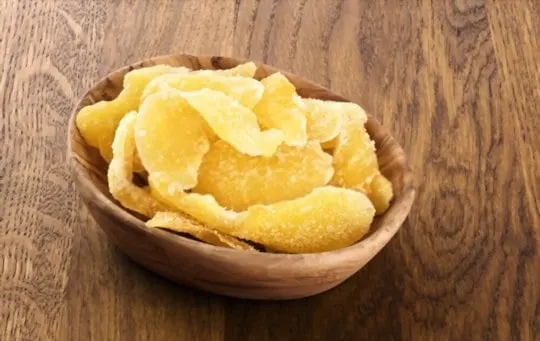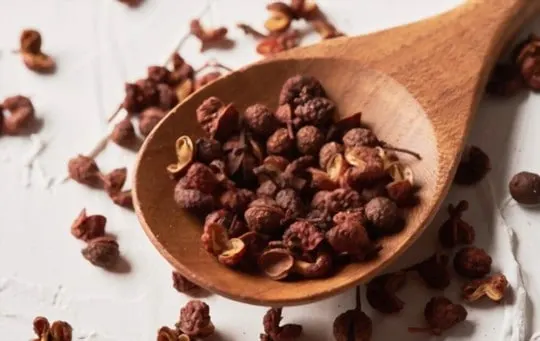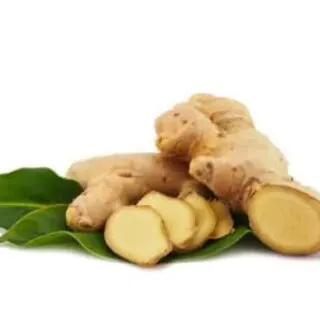If you like the aroma and flavor of ginger, you’re probably aware that it can be used as a spice in cooking, but this is hardly all that ginger root has to offer.
As well as being an ingredient in many dishes, ginger root can also be used for medicinal purposes.
Ginger root has many uses, but whether or not to use fresh versus ground ginger often arises.
The benefits of using fresh ginger root are that its fragrance and flavor are more intense than dried powder.
However, because the fresh ginger root is difficult to crush into a powder form, many people use powdered ginger instead.
Hence, whether or not to use fresh or powdered ginger root can be a very polarizing one.
Here are five substitutes for ginger root that will give you many of its benefits without forcing you to choose between fresh and powdered versions.
What is Ginger Root?

Ginger Root, or Ginger (Zingiber officinale), is a flowering plant in Zingiberaceae.
Its roots are widely used in Asian cuisine but can also be found in Hawaii.
The flavor of ginger root comes from aromatic compounds known as gingerols.
Gingerols are chemical compounds and can be used as medicine for nausea and indigestion.
The flavor of ginger root has been described as spicy, warm, and savory.
It is often used as an additive to food because it adds flavor without calories or fat.
Ginger roots can be found in many foods we eat, like gingerbread and pies.
It is also common to find it in Asian cuisine like stir-fries or sushi.
The uses of ginger root are not limited to food; it has also been used for medicinal purposes for thousands of years.
Extracts made from ginger root are used for many ailments, including nausea and indigestion.
So it comes as no surprise that many stores carry ginger root supplements.
Ginger Root is also highly regarded for its uses in cooking.
It has an aromatic and spicy flavor, ideal for Korean, Indian, Mexican, and Chinese dishes.
Most people consider Ginger Root a kitchen staple because of how often it is used in cooking.
The 5 Best Substitutes for Ginger Root
Despite ginger root’s popularity, it is not necessarily the most accessible.
It can be not easy to find and is also expensive for many people.
The good news is that many substitutes can be used in place of ginger root.
The substitutes listed below serve the same intended purpose as ginger root; they come in different flavors.
This list was created based on value, availability, ease of use, and taste.
1 – Galangal Root

One of the best substitutes for ginger root is the Southeast Asian plant known as galangal.
This plant typically has a pink color with slight purple tints.
It also has leaves similar to that of lily-of-the-valley but much smaller.
Galangal Root typically has a spicy or peppery flavor, but it is not necessarily ginger-flavored.
In terms of texture, it is very woody.
The flavor of galangal root is similar to the ginger root but not quite the same.
So, if you’re a fan of ginger root but want to try something new, galangal can be a good substitute.
2 – Ground Ginger or Powdered Ginger

Ground Ginger is one of the easiest and most cost-effective substitutes out there.
This powder is typically made in a blender and comes from dried and ground ginger roots.
The best thing about powdered ginger is that it’s easy to find and incredibly affordable.
Most ground ginger is typically made from dried and powdered roots.
The flavor profile of powdered ginger is spicy, sweet, warm, and aromatic.
3 – Crystallized Ginger

Crystallized ginger is often used for cooking when a recipe calls for ginger root.
Crystallized ginger is made from dried-out, candied, and preserved ginger root pieces.
In terms of flavor, it can be described as spicy with a sharp sweetness to it.
In addition, the texture tends to be tough and chewy.
This type of ginger is typically less spicy than powdered ginger but does not have the same aromatic flavor.
It’s also recommended to taste it before using, as some brands can be particularly strong or sweet.
4 – Allspice

Allspice is considered the dried and ground fruit of a tree called Pimenta Dioica.
This plant typically has very small leaves with white flowers.
The main components of allspice include pepper, nutmeg, cloves, and cinnamon.
Allspice typically has a similar taste as ginger root, but it is also sweet and spicy.
Furthermore, it may also have notes of cinnamon and cloves.
While allspice can substitute ginger root in most dishes, it is crucial to note that it cannot replace powdered or fresh ginger in baking.
This is because the flavor profile does not change when cooked with heat; the flavors are stronger when raw.
5 – Sichuan Peppercorns

Sichuan peppercorns are a spicy and dry pepper from a plant called Zanthoxylum.
Sichuan Pepper is related to the citrus family but not to black pepper or chili peppers.
In most dishes, Sichuan peppercorn can be used to substitute fresh ginger root.
Sichuan peppercorn typically has a lemony taste, with a bit of zing and spiciness.
It also has some pine and eucalyptus notes and its spicy and citrusy flavors.
Furthermore, the intensity of the flavor can vary from one plant to another.
In terms of texture, Sichuan peppercorns are not typically tough or chewy.
They can also be used to create a tingling sensation on the tip of the tongue.
Conclusion
Ginger root is a versatile ingredient that can be used for multiple dishes.
Luckily, there are plenty of alternatives that do not sacrifice flavor or texture.
Depending on your preference, you can use any substitutes to replace the ginger root.
Keep in mind that not all substitutes are appropriate for baking.
That said, if you’d like to substitute ginger root in your baked goods, make sure to taste the substitute first before using it in a recipe.
Not all substitutes can be used in baking, and some may have a strong flavor that could affect the outcome of your dish.

The 5 Best Substitutes for Ginger Root
Ingredients
- Galangal Root
- Ground Ginger or Powdered Ginger
- Crystallized Ginger
- Allspice
- Sichuan Peppercorns
Instructions
- Choose your preferred substitute from the list of options.
- Organize all of your ingredients.
- Follow the substitution ratio to determine how much is required in your recipe.
